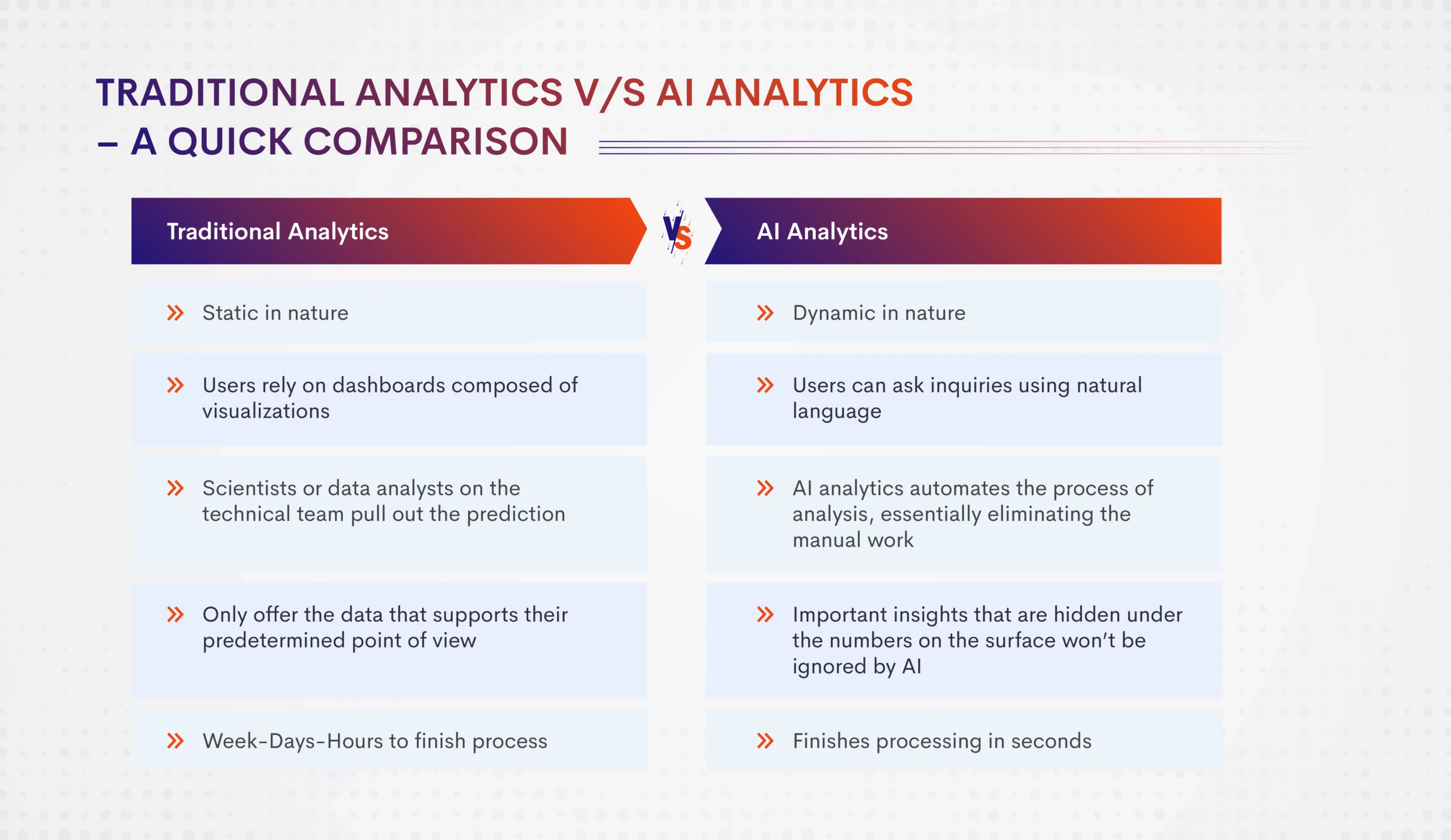- Blog
- September 21, 2022
AI Analytics will lead the future

- Blog
- September 21, 2022
AI Analytics will lead the future
AI Analytics –What it is and Advantages?
A branch of business intelligence termed AI analytics uses machine learning methods to unearth new patterns, correlations, and insights in data. AI analytics is actually the process of automating a lot of the tasks that a data analyst would typically complete. For analysts, AI analytics frequently enhances their capabilities in terms of speed, the volume of data that can be examined, and the level of detail that can be tracked.
In today’s world, artificial intelligence, deep learning, and machine learning technologies can be used to automate data processing, a task that has historically taken a long time and needed a lot of human work. With the use of methods like natural language processing (NLP), voice analytics transcription, and computer vision for picture and video analytics, AI is increasingly able to evaluate unstructured data sources in addition to structured data sources.
Demand for AI technologies
According to studies, the artificial intelligence market would grow from a size of USD 86.9 billion in 2022 to USD 407.0 billion in 2027, at a Compound Annual Growth Rate (CAGR) of 36.2%. Across the value chain, AI technologies are functionally finding many applications, but some parts of the value chain are receiving more attention than others. For instance, activities related to customer services, such as sales and marketing, operations, and product development. On the other hand financial and general management fall far behind. There are numerous business advantages to AI systems if implemented wisely. That’s why those who are constantly moving forward are receiving excellent ROI. McKinsey Digital claims that AI-powered prediction may cut supply chain network mistakes by 20 to 50%.
Moreover, AI Analytics has the ability to do independent data analysis. Effective algorithms, cutting-edge computer hardware, and data-generating sensors have all come together to make AI analytics ready for scalability. With highly automatable operations and expanding network of linked devices, the industrial sector holds particular promise for AI’s potential benefits.

Advantages of applying AI analytics to businesses include:
- Risk control: AI analytics can produce smarter tactics and increase the efficacy of risk management models.
- Novel functioning: Big data analysis is carried out by AI analytics tools, which can be used to create new goods or update ones that already exist.
- Smooth acceleration in the supply chain: Supply chain executives see AI in analytics as a disruptive force that enables them to use data-driven expertise to apply to problems that couldn’t be solved before.
- Easy customer interaction: Utilize AI analytics tools to learn what your customers want and then find ways to attract, keep, and reward them.
Power of AI Analytics in today’s world:
- Reduces complexity, keeps expenses under control, gets rid of false positives, and increases compliance while analyzing multi-variate processes scattered across several locations.
- Aids in the democratization of data so that business users may access and utilize role-based information rather than just plain data without the need for human interaction.
- Helps in finding trends, making forecasts, and predicting scenarios using a wide range of heterogeneous data sets.
- Provides business users with a compelling experience for making snap judgments based on unstructured data without involving either data scientists or technical resources
- Gives decision makers improved insight by integrating copious data from many business services and data sources utilizing a single platform.
- Aids business users in finding and using business insights in very imaginative ways to deal with an imminent threat or an emerging opportunity/revenue stream.
- Enables a paradigm change from Big Data to All Data and the creation of solutions that are centered around the needs of the client by rethinking and speeding processes.
- Steps-up Self-Service Analytics to enable business users to quickly evaluate unstructured data, improving the understanding of business scenarios.
With the help of big data and AI-powered analytics, businesses can provide quality services to their users with the intuitive tools and reliable technologies to derive high-value insights from data, promoting data literacy throughout the company and reaping the rewards of becoming a truly data-driven organization.
Accuracy check of AI:
After all, AI frequently functions in the background. The user may not always be aware that AI is analyzing data. Once the analysis is finished, all they get is an answer. People have a right to be skeptical about accuracy given the quick turnaround between asking an inquiry and receiving a response.
Additionally, multiple frames of reference for data analysis will exist throughout various business functions. If a data scientist observes the machine learning techniques that are used, they might be able to infer what is happening. Furthermore, they can confirm the data’s accuracy because they have direct access to the data.
Summing up :
AI does not approach data with assumptions or preconceptions—a state of “mind” that even the most objective person can never achieve. In this regard, AI’s analysis capabilities may even surpass those of humans in terms of accuracy.
With rising sales and operational effectiveness, more businesses are turning to AI to aid them in identifying trends and patterns. The way we work and live will change as these technologies evolve, and they will also open up new possibilities that we are only now starting to imagine.




